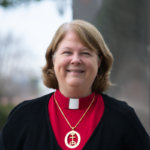 By Conference Minister Diane Weible
By Conference Minister Diane Weible
I, confess, I am an assimilationist.
Ibram Kendi, in his book, “How to be an Antiracist,” defines an assimilationist this way:
“Assimilationists can position any racial group as the superior standard that another racial group should be measuring themselves against, the benchmark they should be trying to reach.” (pg. 29)
I get that there are degrees to this, and I know if someone accused me of believing that a person with skin a different color from mine did not measure up to me, I would become defensive and argue this is not what I believe. But as I lean into my discomfort around this idea, I realize that I do carry assimilationist ideas.
As many of you know, I grew up in St. Louis. From the time I was little, I was taught that the predominantly white communities of South County and West County were safe and the communities of North County and East St. Louis (Illinois) were not safe—they were places where schools were not well maintained and violence and drugs were rampant. This article is not about how and when I learned that I was missing huge pieces of this story.
Instead, I want to say that Kendi’s definition of assimilationism convicted me. Even in my (I thought) altruistic belief that all people should be treated equally, I know in my heart that I believed equal meant “so they could become like me.” People in some communities were not as good as me—no fault of their own, I convinced myself, but because of how the racist policies and systems took away the basic rights of humanity—healthcare, education, housing, safety—and sought to maintain power and privilege over people in those communities.
Kendi is clear. Any human is just as good as any other human. Equity is the problem. We don’t treat one another in ways that are equitable but that doesn’t make someone better than someone else. There is no hierarchy in humans. We have to separate an individual’s inherent worth as a child of God from the policies and systems that seek to oppress them and make others feel superior.
That subtle difference is so important. As people of faith, we believe that God created all of us as beautiful, unique, and wonderful human beings. We believe that no human is less than another and no human is greater than another.
People of color don’t need better schools or better healthcare or better community resources in order to become better human beings. They already are. Every single person is a beautiful, capable, perfect human being just as God has created them. People of color deserve better schools because they are just as worthy of those important resources as I am and, therefore, deserve equal and just treatment.
It is a subtle but important mental shift in how we think. If we believe in the inherent worth and beauty of every person created by God, we stop thinking in patronizing ways. We stop thinking that we need to take care of them or what we can do for them to make them more like us.
Instead, we focus on the ways that another child of God is being mistreated by systems and policies, and people exerting power and control in order to maintain their own power. When we finally get this, really, really understand this, we see all the ways we need to confront our own biases, our own belief systems in order to show up in the ways that humanity needs us to show up.

